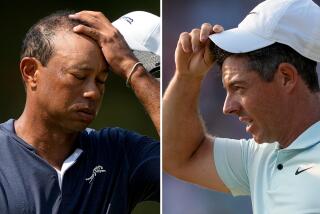Don’t Forget Your Sweater
- Share via
A message of consolation to Tiger Woods, who shot an 81 in the third round of the British Open last July when temperatures dipped into the 50s and winds exceeded 30 mph:
They used to play this tournament in October.
The Open Championship was originally scheduled to coincide with the autumn meetings of the Royal and Ancient Golf Club of St. Andrews. The date was changed more than a hundred years ago, not because of the weather, but because the Scots finally learned how to mow the lawn.
“They didn’t have a mechanism for cutting the grass,” said David Malcolm, a golf historian born and based in St. Andrews. “There was no such thing as summertime golf. It happened gradually.”
Even now -- the Open begins today at Royal St. George’s on the southeast coast of England -- rain and wind can make July in Britain feel like November in New England.
“This is what links golf is all about,” said George Brown, in his 17th year as golf superintendent at Turnberry Golf Links, three-time site of the Open. “If there’s no wind or rain, they’d eat [the courses] alive.”
A year ago, Muirfield -- located on the Firth of Forth, a North Sea inlet -- ate the players alive on Saturday. Nine golfers who teed off after 1 p.m., Woods included, shot 80 or higher.
That day ranks among the most unbearable in Open history. Here’s a look at six Opens that many believe featured the most unplayable weather conditions:
1873, St. Andrews
In rain and wind, Tom Kidd, a St. Andrews caddie, won the first Open to be played anywhere but Prestwick. His victory halted Tom Morris Jr.’s streak of Open championships at four.
“It was absolutely atrocious,” Malcolm said. “Local newspaper accounts of the day say it was just farcical.”
The weather was so poor that the Kidd shot 91-88 -- 179, the worst 36-hole winning score in the tournament’s history. (The Open didn’t become a 72-hole event until 1892.)
Driving rain collected in front of the 18th green, an already treacherous area called the Valley of Sin. Players whose balls splashed down had two options: Hit out or take a one-stroke penalty for lifting and dropping. According to Malcolm, standing water did not entitle a player to a free lift until the 1938 Open at Royal St. George’s.
1937, Carnoustie
Unrelenting rain soaked Carnoustie on a tenuous final day, nearly postponing the round.
“All through the afternoon,” Bernard Darwin wrote in Country Life, “the authorities were on tenterhooks.”
Winner Henry Cotton, nicknamed “the Maestro” for his ability to blast balls out of divots with his driver, defied the elements with a final-day 71.
“One of the greatest rounds of my life,” said Cotton, a three-time winner of the Open.
Cotton needed only 26 putts over the final 18 holes. His four-day total of 290 topped a field that included Walter Hagen, Gene Sarazen, Sam Snead and emerging star Byron Nelson, 25, whose 1937 Masters victory had earned him a spot in the field.
“Worst weather I’ve ever played in,” said Nelson, now 91. “The peculiar thing is we have high wind and rain here, but for some reason the atmosphere there affects the golf ball more.”
1938, Royal St. George’s
Writer Henry Longhurst canvassed the grounds of Royal St. George’s the morning of the third round to find the British Open tent blown to the ground by an overnight storm.
“I have just made a tour of the wreckage of the great exhibition tent,” Longhurst wrote in the London Evening Standard, “and a very pathetic site it is. Most of the clothes on show have been blown away completely.”
In gale-force winds, Reg Whitcombe managed a 75 and 78 to come from behind to win. He needed 295 strokes, averaging just under 74, to top the field by two.
No winning score has come closer than two shots to that 295 total since then.
R.G. French set an Open record for one-day scoring differential, shooting 91 in the third round a day after carding a 71.
1960, St. Andrews
The event’s centennial featured torrential rains. Arnold Palmer, winner of that year’s Masters and U.S. Open, manufactured a 68 on the final day but lost by one to Australian Kel Nagle.
“I remember that well,” said Malcolm, who attended the event and remembers a famous photograph of “water pouring down the steps in front of the R&A; onto the 18th green.... It was hell on earth. They delayed it one day because it was completely unplayable. That probably cost Arnold Palmer the championship.”
1986, Turnberry
Greg Norman recorded a 63 during a second round that featured so much wind that only one player, Ian Woosnam, reached the 440-yard par-four 14th hole in two shots. Brown, the course superintendent, said Woosnam needed a second-shot one-iron to get to the green.
He made the day’s only birdie on the hole. Brown called Norman’s performance, which vaulted him to a four-day total of 280 and his first major championship, “one of the finest rounds of golf ever.”
1988, Royal Lytham and St. Annes
Rain washed out the third day. Officials wanted to play 36 holes Sunday, but continued rain led them to schedule the final 18 on Monday, the only time that has occurred in Open history.
Seve Ballesteros went on to win the tournament, beating the elements as well as the field.
Wind, rain and cold temperatures set the tone from the first round. Of the conditions, Curtis Strange, who opened with a 79, said, “It seemed to destroy what little confidence you’ve got left.”
Brad Faxon survived the first round with a 69, which was a stroke behind Ballesteros. “This is what the British Open is all about,” he said. “Wind, bad weather, a little bit of rain, sweaters, rain gear and turtlenecks. It tests your head a little bit.”
2002, Muirfield
Woods -- who at one point hit a five-iron from 135 yards during that third round -- shot the highest score of his professional career. A day after his scorching 64, Colin Montgomerie flamed out with an 84. His 20-stroke swing equaled French’s record, unmatched for 64 years.
It was a historically bad round for Woods, who had won the Masters and U.S. Open and was working on the third leg of the Grand Slam.
“The heavens opened and God made the decision on Saturday that Tiger Woods would not win,” Malcolm said. “And I am an atheist.”
More to Read
Go beyond the scoreboard
Get the latest on L.A.'s teams in the daily Sports Report newsletter.
You may occasionally receive promotional content from the Los Angeles Times.










